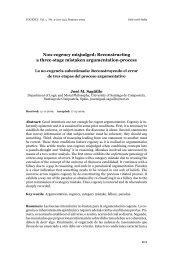Cogency v2 n2
Cogency v2 n2
Cogency v2 n2
You also want an ePaper? Increase the reach of your titles
YUMPU automatically turns print PDFs into web optimized ePapers that Google loves.
Wittgenstein’s influence on the development of informal logic / R. H. JOHNSON<br />
Second, the “in” of informal was originally conceived to signal a kind of<br />
negation of formal (deductive) logic. At the start of the initiative, there was<br />
an underlying dissatisfaction with, if not downright hostility to, formal logic. 3<br />
There were questions about its ability to illuminate natural language arguments,<br />
“arguments on the hoof” (as Woods would later refer to them), and<br />
many thought that the validity requirement was too stringent, that there<br />
could be perfectly good arguments that were not valid; viz., inductive arguments<br />
and appeals to authority, for example. Some of this antipathy towards<br />
formal logic may have been due to Wittgenstein, who has some caustic comments<br />
about mathematical logic in Remarks, as we shall see.<br />
Third, an obvious point is that “informal” must take its meaning by way of<br />
contrast to “formal.” Yet this point was not made for some time, hence the<br />
nature of informal logic remained somewhat opaque, even to those involved<br />
in it. It is helpful to have recourse to Barth and Krabbe (1982: 14f.) where they<br />
distinguish three senses of the term “form.” By “form 3<br />
,” Barth and Krabbe<br />
mean to refer to “procedures which are somehow regulated or regimented,<br />
which take place according to some set of rules.” Barth and Krabbe say “we do<br />
not defend formality 3<br />
of all kinds and under all circumstances.” Rather “we<br />
defend the thesis that verbal dialectics must have a certain form (i.e., must<br />
proceed according to certain rules) in order that one can speak of the discussion<br />
as being won or lost” (p. 19). In this third sense of “form.” informal logic<br />
can itself also be formal. That is, there is nothing in the Informal Logic initiative<br />
that stands opposed to the idea that argumentative discourse should be<br />
subject to norms, rules, criteria, standards and/or procedures. What was<br />
opposed is that the idea that the sole logical criterion for evaluating arguments<br />
is validity–the view that validity (understood as necessary consequence;<br />
i.e., as it being the case that the conclusion of a good argument follow necessarily<br />
from its premises) is a necessary condition for a good argument.<br />
Interpreting Wittgenstein<br />
I have already indicated that my focus here will be on the so-called “later<br />
Wittgenstein.”Among the interpreters I have found helpful: Pitcher(1966),<br />
3<br />
The source of dissatisfaction can be traced to Bar-Hillel (1969). See Johnson and Blair<br />
(1980: 27, n.10).<br />
85








